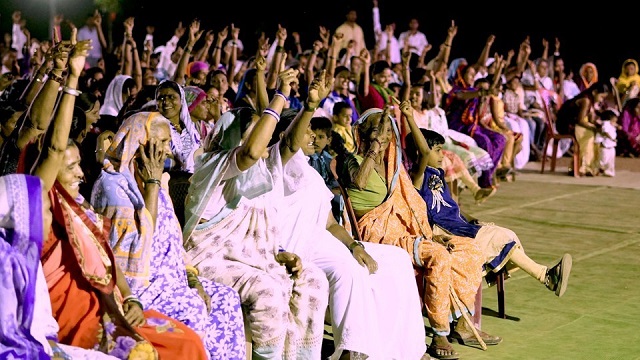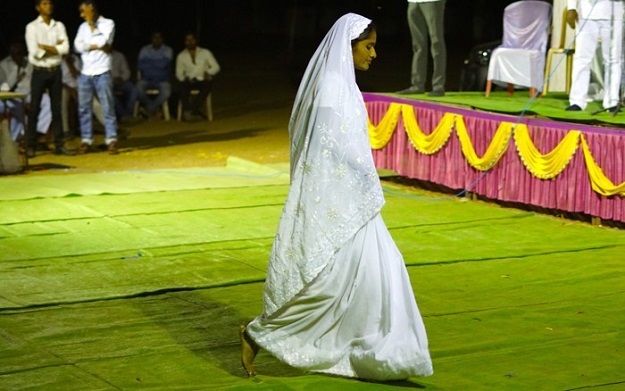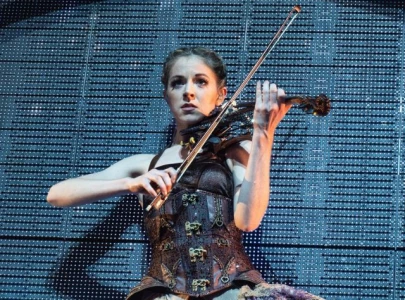
According to The Atlantic, low-caste Hindus, or untouchables, as they are known in India, are converting to Buddhism en masse as the policies and practices of the right-wing government in New Delhi push them to the fringes of Hindutva society.
The American magazine has reported on a recent conversion event which took place in the state of Maharashtra, famously known for the bustling metropolis of Mumbai, where some 500 low-caste Hindus took to an open field in a village and converted to Buddhism.
“I shall have no faith in Rama and Krishna who are believed to be incarnations of God nor shall I worship them. … I do not and shall not believe that Lord Buddha was the incarnation of Vishnu. … I shall hereafter lead my life according to the principles and teachings of the Buddha," they were quoted as chanting during the ceremony.
The converts were Dalits, and belong to the lowest of Hindu castes in India. The form of Buddhism they had converted to is called Ambedkarite Buddhism, a movement founded more than 50 years ago by a social reformer who wanted radical change in the Hindu caste system. The message is powerful for the 'untouchables' of Indian society and continues to appeal to a large number of people to this day, according to the US-based publication.
Low-caste Indian Dalit killed for owning horse
Dalits constitute almost 20 per cent of the population in India, and a majority of them are not pleased with the Modi government. Recently, hundreds of thousands of Dalits took to the streets across the Hindu-majority country in protest against the discriminatory policies adopted against them by the state.
However, low-caste Hindus have always been a persecuted group in the Indian society, and figures released by a government agency reveal that crimes against 'untouchables' have skyrocketed by an astounding 66 per cent in the last decade. The National Crime Record Bureau data also disclosed that rape of Dalit women in India doubled between 2007-2017.
The report in The Atlantic noted that the protests, which are growing steadily larger every day, will have a major impact on the general elections scheduled for the next year. Strikes and social media furor over the mistreatment of low-caste Hindus is also rising across India, it added.
One of the descendants of the founder of Ambedkarite Buddhism, Rajratna Ambedkar, told the American magazine that mass Buddhist conversions are taking place across India almost every day.
According to his account, after helping convert 500 people in Shirasgaon last month, he woke up early the next morning to drive to the city of Surat, where he converted another 500 people that night.
Seven reported killed as India's Dalits lead protests against court ruling
According to official data, Indian Buddhists only number about 8.4 million in a country of 1.2 billion people, and an overwhelming 87 per cent of these Buddhists are Ambedkarites or converts. The Atlantic noted that accurate statistics on Buddhist converts are hard to find because many are not registered as such on the census.
“Often the [census] surveyor doesn’t even ask about religion once he hears a Hindu-sounding name,” said Shiv Shankar Das, a former researcher at Jawaharlal Nehru University who has studied the neo-Buddhist movement.
“We are trying to convince the Indian government that we are not Dalits anymore, not part and parcel of Hinduism,” said Rajratna Ambedkar, a modern Buddhist.
Ambedkarite Buddhism is an increasingly popular option for dissatisfied Dalits because converting from Hinduism to Islam or Christianity is now illegal in several states.
Buddhism is considered a “sub-sect” of Hinduism in Article 25 of the Indian Constitution, which is a useful loophole for conversion - and a hindrance, because it’s a major reason why the Hindu establishment doesn’t fully recognise Buddhist identity today.
'We're ashamed', PM Modi finally acknowledges rape, murder of Muslim minor
 A woman participates in a conversion ceremony in India. PHOTO COURTESY: THE ATLANTIC
A woman participates in a conversion ceremony in India. PHOTO COURTESY: THE ATLANTICOver the course of Indian history, Buddhism has been uneasily absorbed into the Hindu fold, with some arguing that Buddha was really an incarnation of the Hindu god Vishnu. This is a fiercely contested notion, one that converts to Ambedkarite Buddhism specifically pledge to reject.
The activist spirit is central to the Ambedkarite revival. Consider two recent alarming incidents of caste violence: In Saharanpur, Uttar Pradesh, at least 25 Dalit houses were burned and one person was killed when communal tensions boiled over in May 2017. And in Una, Gujarat, four Dalits were publicly flogged for skinning a dead cow in 2016.
Both communities used Buddhism as a tool of protest. In a striking gesture, Saharanpur Dalits drowned their Hindu idols in a canal after the incident, and 180 families converted to Buddhism. All four of the Una victims plan to convert to Buddhism soon.
Conversion is even becoming a political weapon. A famous Dalit politician and member of parliament known simply as Mayawati has threatened to convert to Buddhism with her many followers if BJP members “don’t change their disrespectful, casteist, and communal behavior towards the Dalits.”
This article originally appeared on The Atlantic




1732875433-0/BeFunky-collage-(6)1732875433-0-165x106.webp)
1732874090-0/BeFunk_§_]__§-(1)1732874090-0.jpg)

1732865927-0/Untitled-design-(74)1732865927-0-270x192.webp)









COMMENTS (2)
Comments are moderated and generally will be posted if they are on-topic and not abusive.
For more information, please see our Comments FAQ